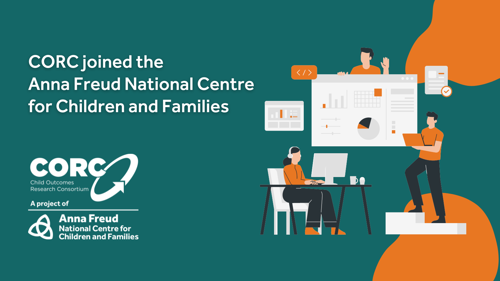Better together: CORC joined the Anna Freud National Centre for Children and Families

After a long history of close association, the Child Outcomes Research Consortium has recently formally moved into the Anna Freud Centre. From this new organisational setting, CORC will continue to work as a membership body and learning collaboration to progress its aim – for all child and youth wellbeing support to be informed by real-world evidence – an aim closely aligned with the aspirations of the Anna Freud Centre and of the Evidence Based Practice Unit (a collaboration of the Centre and UCL).
Peter Fonagy, Jess Deighton and Kate Dalzell reflect on some of the reasons we are so excited by this development, and why it seems so timely to us.
The gap between children and young people’s need for mental health support and the help available is significant and growing. We see a greater number and wider range of actors in children’s lives hearing that need and mobilising to respond. This wider mental health ‘workforce’ includes not just mental health professionals but all those in close contact with children and young people; from school staff to social workers; childcare providers to community groups; family members to faith leaders, police to primary care.
With the increased attention and energy being directed toward child and youth mental health, we are at the start of a period of rapid innovation. It is vital that we nurture this by learning as we go. While we need to get better at sharing the knowledge that we do have from research, there are huge gaps in that knowledge – for example our understanding about what is helpful in these community and universal/ non-specialist settings, or at early stages of intervention, is still thin.
Routine use of outcome measurement and feedback questionnaires gives those who help children and young people a way to build up evidence about the impact they are having. It also provides a mechanism for children and young people to routinely and systematically share their perspective on the difficulties they are experiencing. Over the last decade CORC member organisations, supported by the CORC Team, have been collaborating to work out better and more meaningful ways to gather this feedback, and to use it to improve care. While that work was initially driven by clinicians in NHS services, it has been broadening over the years, extending through voluntary sector mental health providers, to school and education-based provision, to social care and early years contexts and to a wide range of creative and community-based wellbeing organisations.
Our vision is that everyone who works to improve children’s emotional wellbeing is reflective about what they do: that they gather information to understand what works well, and what does not, so we can get better at helping children and young people. We want to support practitioners’ capacities to do this in their own contexts. The learning accrued through CORC – about the measurement tools that are practical, robust and meaningful in different contexts, about approaches and tools that help with collecting and interpreting feedback – and even more importantly the learning community itself, through which good practice can be shared and built upon – is a fantastic platform through which this can happen.
We know that the factors that influence children and young people’s mental health are many and complex and include aspects of young people’s lives playing out at individual, family, community and structural levels. The Anna Freud Centre is involved in work at every level of this system, with specialists and partnerships, to invent, influence and implement new models of care that address the gaps in help. We are hugely invested in strengthening the formal research evidence-base and as such we appreciate why this takes time. Alongside this, CORC’s coming into the Centre marks our commitment to complementing this with practice-based evidence, which can be more timely, accessible and relevant to a particular context. By supporting people to be evidence-led in their own contexts – to demonstrate and to hone the impact they have on children and young people’s lives – we hope to be able to help the sector be greater than the sum of its parts, and to do more and go further in helping children, young people and families.

Peter Fonagy, Chief Executive, Anna Freud Centre, on the merging of CORC with the Anna Freud Centre:
"The rationale for merging CORC with the Anna Freud Centre is, to me, self-evident. As the public rightly demands more mental health support, we have a responsibility to ensure that support is of the highest quality and draws on the best evidence, work that CORC has been developing since its inception in 2002.
I feel incredibly privileged to have worked so closely with CORC. I have greatly admired its work in developing outcome monitoring, in managing and analysing data, and in making data routinely usage more accessible. CORC has carried out ground-breaking work and disseminated its findings through its excellent and highly engaged networks. As part of Children and Young People’s Improving Access to Psychological Therapies (CYPIAPT) CORC, used routinely collected data to carry out the first detailed analysis of the outcomes and experience of children and young people seen by mental health services. Its work on wellbeing measurement for schools has been ahead of its time and continues to flourish and develop.
As we, as a society, take a more holistic approach to mental health, all adults working with children will need to have more information and understanding about how to support children and young people. This is the principle that lies at the heart of our Closing the Gap strategy and it’s an inclusive and democratic one. Data is empowering. By understanding what works, and engaging in the process of learning from practice, professionals can develop the tools they need to support children and young people with their mental health.
The merging of the Anna Freud Centre with CORC will result in pooled expertise, shared learning, increased intellectual capital, more powerful dissemination at a time when it has never been more needed.
It leaves me to give my heartfelt thanks to the CORC board, not only for their fantastic legacy in promoting evidence-informed practice, but also in creating a sound platform for the ongoing development of this work, and to offer a huge and warm welcome to the CORC team."
Peter Fonagy, Chief Executive, Anna Freud Centre
If you also believe that using evidence in a meaningful way can help us to make child and youth mental health support more effective, responsive, and focussed on the outcomes that are important to children and young people, please do join us by signing up to the CORC Network - we are always keen to her from potential collaborators at corc@annafreud.org.
Kate Dalzell, AFC Head of Evidence-Led Practice and Child Outcomes Research Consortium Lead
Jess Deighton, AFC Director of Applied Research and Evaluation